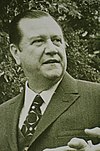Venezuelan parliamentary election, 1993
|
|
|||||||||||||||||||||||||||||
|---|---|---|---|---|---|---|---|---|---|---|---|---|---|---|---|---|---|---|---|---|---|---|---|---|---|---|---|---|---|
|
|||||||||||||||||||||||||||||
|
|||||||||||||||||||||||||||||
|
|||||||||||||||||||||||||||||
General elections were held in Venezuela on 5 December 1993. The presidential elections were won by Rafael Caldera of National Convergence, who received 30.5% of the vote.Democratic Action remained the largest party in the Chamber of Deputies and Senate, which were elected on separate ballots for the first time. Voter turnout was 60.2%, the lowest since World War II.
The election campaign was dominated by the corruption charges brought against sitting President Carlos Andrés Pérez, which led to his impeachment on 20 May 1993. He was replaced by Octavio Lepage as Acting President until Ramón José Velásquez was elected by Congress as interim President on 5 June. An atmosphere of economic and political crisis prevailed, with general economic problems compounded by a banking crisis, and a declining legitimacy of the traditional main parties, Democratic Action and Copei. The previous year had seen two coup attempts in February and November, reflecting widespread popular discontent with the political establishment.
Rafael Caldera, founder of Copei, rejected his old party and led a "National Convergence" of 17 smaller parties - including the Movement for Socialism, the Democratic Republican Union, the People's Electoral Movement and the Communist Party of Venezuela. His campaign promises included pardoning the 1992 coup plotters, including Hugo Chávez.
...
Wikipedia


